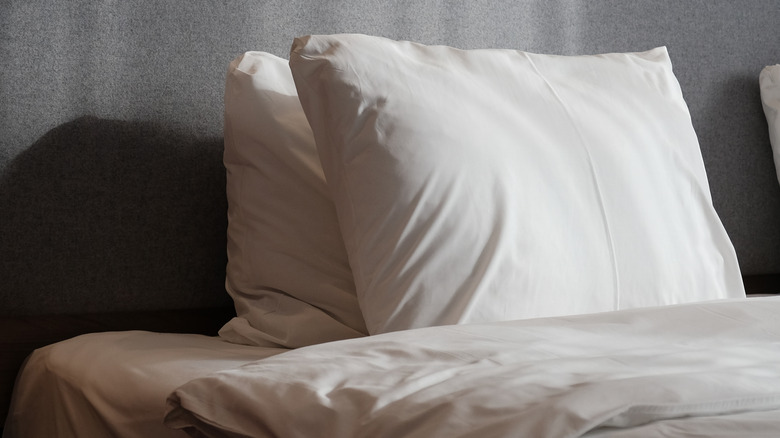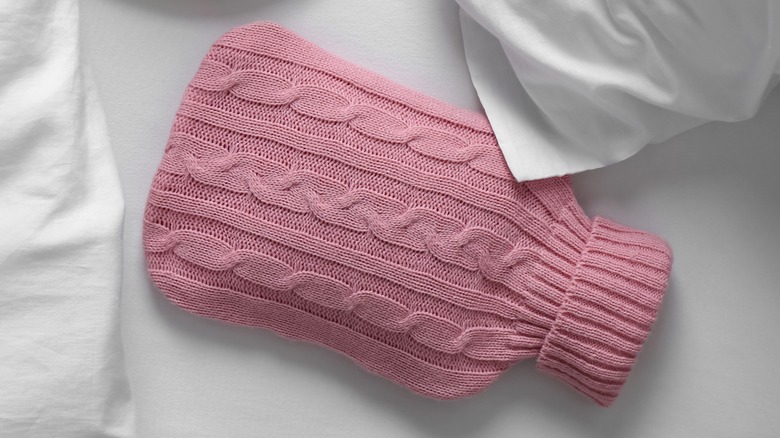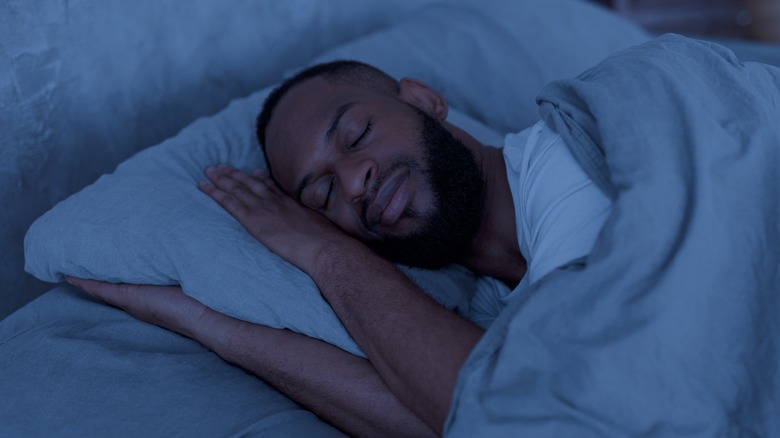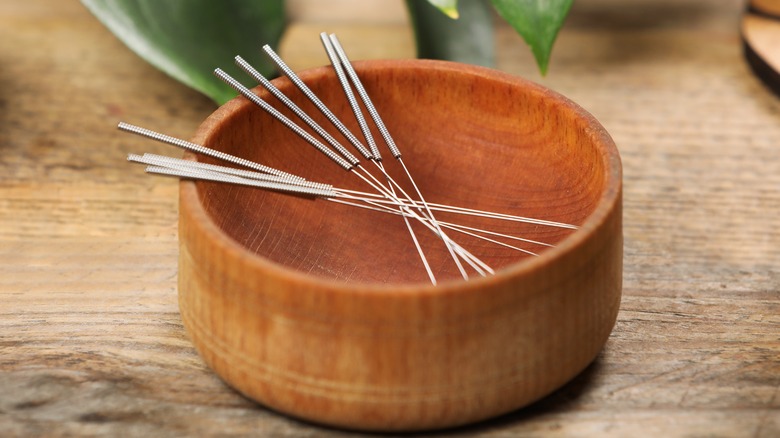What You Should Do When You Wake Up With A Stiff Neck
Few things on Earth are more satisfying, more wholesome, and more downright enjoyable than a good night's sleep. Heading to bed knowing you're going to feel well-rested and fresh in the morning is one of life's great pleasures — until you rise out of bed, ready to face the day, and immediately notice that your neck is killing you.
Our desire to sleep soundly (and avoid neck pain upon waking up) is something that pillow companies cottoned on to a long time ago, which is probably partly why the pillow industry raked over 16.5 billion dollars in 2021, with a projected revenue of well over $18 billion by 2024 (per Statista). Unfortunately, you can have the fanciest pillow money can buy and still end up with a crick in your neck that stops you from being able to do the most basic of functions with ease.
So the question, then, is this: What do we do when we're faced with an aching neck after waking up? How do we best treat it, and how can we figure out why our neck is so sore? Well, folks, we've got the answers right here.
Stretch it out
If your first instinct when you wake up with a stiff neck is to keep it still and avoid aggravating it, we can definitely understand that: The last thing you want, after all, is to make an ache worse. But introducing gentle movement to the neck area, and stretching it gently, can produce a positive result. Stretching your neck out will stop your muscles from becoming weaker when it's stiff, and will also help you to regain and retain flexibility in the neck area, says Spine-Health.
The most important thing to do is to keep your stretches simple and easy, to lightly loosen your neck up. Begin by bending it back, then forward. Start by moving your head back to look towards the ceiling, feeling the stretch through your throat and your frontal neck muscles, and holding this position for five to ten seconds. Then, move your head in the opposite direction, looking down towards the ground and stretching out the back of your neck. After that, introduce a gentle stretch through the sides of your neck by bending your head first towards one shoulder, and then towards the other. Finally, perform a neck rotation by turning your head slowly over one shoulder, and then the opposite way. Depending on where your neck is aching, some of these stretches might be trickier to perform than others, so be sure to listen to your body and take things slowly.
Icing your stiff neck could supply relief
Sometimes, you just need to keep it cool, folks. And that's particularly the case when you have a stiff neck. By applying ice or a cold compress to your aching neck muscles, you can assist in bringing down any swelling or inflammation that's occurring in the area (which could be caused by excessive pressure through a night's sleep), thereby speeding up the healing process (via Healthline). When combined with heat therapy, icing your neck is one of the most effective ways to get it back to its full glory.
But like all things in life, there's a right way and a wrong way to apply ice. The first thing to bear in mind is that your skin, and your body, probably won't thank you if you're putting ice directly on your skin. Instead, grab yourself a cold pack or a cold compress and ice the area for no more than 20 minutes at a time, taking breaks when you need to (per OrthoInfo). Repeat this process several times throughout the day. If your cold compress is a little too told, you can always wrap it in a light sheet or some kitchen towel, to create a barrier between the chilled item and your skin.
It might be helpful to take pain medication
Let's be real, folks. A stiff neck after waking up can hurt. A lot. And despite certain unsympathetic people rolling their eyes at your pain, you know and we know that sometimes, it's not as simple as just shaking it off. That's where pain medication can come into play to help treat a painful neck, according to the Mayo Clinic. Oftentimes, neck aches after sleeping can be easily tackled using NSAIDs like ibuprofen or naproxen (which can bring swelling down in the neck area) or simple over-the-counter painkillers like acetaminophen.
Just remember that when you're taking pain meds, you need to follow the package instructions, and never exceed the recommended dosage. Despite being widely available, over-the-counter medications can still have a huge negative impact if consumed in excessive quantities, and taking too many NSAIDs specifically can produce harmful consequences to your kidneys, your stomach, and on occasion, your liver (per Harvard Health Publishing). If standard pain meds don't shift your aches, it's advisable to discuss your situation with a doctor, as they may be able to prescribe you a different, more effective medicine.
Take a long, hard look at your pillow
When we wake up with a fierce pain shooting through our neck, the first thing we often blame is our pillow. In reality, neck pain can be caused by other things aside from what we lay our head on every night, but our pillows do still play a large role in our neck comfort when we wake up (via the Cleveland Clinic). And unfortunately, one of the most common types of pillow, the feather pillow, can cause the most trouble. "These feel super comfy when you first settle in. But the feathers move when you do, so you wind up with no support, causing you pain," warns chiropractor Andrew Bang.
So, how do we pick the right pillow for our poor necks? It's all in the angle, Bang says. Ideally, your pillow shouldn't crunch your neck too far forward, or let it lay back too much. You want your neck to remain parallel to your body and your mattress, and to remain well-supported throughout sleep. Going for a foam or cervical contour pillow will generally provide the best support, thanks to the angle they place your neck at during sleep, Bang advises. You might also want to opt for a pillow made of latex, as they can be super-supportive while also keeping you comfortable and cool during sleep.
Think about your stress levels
Look, we're not going to lie to you: Modern life is stressful. Between rolling news 24/7, rushing around from your job to seeing your family and friends, and constant pinging reminders on your phone, it's no wonder we all feel a little run-down now and again. And if you're particularly stressed, this may be manifesting itself in neck pain when you wake up, says Healthline. When we're more stressed, we can tend to hold additional tension in the muscles in and around our neck, including our shoulders and our upper back. This can cause eventual strain and pain, which may not be clearing itself up in sleep.
The good news, though, is that when we bring our stress levels down, this tension can reduce, and our neck pain may clear up. And while we're acutely aware that "Reduce your stress levels!" is way easier said than done, introducing a few things into your day-to-day life can assist in relaxing you. Try incorporating a small amount of exercise into your daily routine, or create a five-minute window to shut your eyes and practice some deep breathing, says WebMD. Make time and space for the things you enjoy, too, and remember to take regular breaks from work or stressful situations.
A massage can help to ease pain
When your muscles are tired and aching, few things can assist in relieving them like a massage. And it could be just the thing when you have a stiff neck.
When you massage muscles in your neck, it helps to increase the blood flow to them, which can bring down swelling and supply the affected muscles with oxygen (via the University of Minnesota). The repeated pressure on your muscles can also encourage them to relax and loosen up, and this can bring your pain levels down.
It's advisable to ask someone you trust, like a partner, to perform the massage for you, and to check in with them regularly while they're doing so (per the Cleveland Clinic). "You'll want them to say, 'How does this feel? Do you want more or less pressure?' That's what a massage therapist will do," states chiropractor Andrew Bang. Crucially, though, it's useful to ask your appointed massage therapist, whoever they may be, to perform movements that operate towards your heart instead of away. This mimics the movement of your blood through your veins and prevents any complications from combatting against this.
You might want to examine the position you sleep in
"I must have just slept funny," says absolutely everyone when they wake up with a sore neck. And as it turns out, there's truth in that stock phrase, with sleeping in awkward positions (or even just normal-seeming positions) being a key cause of neck pain (per Healthline). Assessing how you sleep could allow you to make adjustments to avoid further aches.
Neck pain after waking up is particularly prevalent in folks who sleep on their stomach. When you lay down for a good night's rest on your belly, you're twisting your neck into an awkward position, and if you remain that way throughout the night, it can result in your muscles being incredibly sore the next day. This may be exacerbated even further if your mattress isn't adequately supportive, with this also creating strain on your back muscles. While you might assume that your sleeping position is beyond your control (after all, who knows what you're up to when you're asleep), the good news is that you can train yourself to sleep on your back instead, as the Sleep Foundation indicates. Placing pillows around your body as you sleep or a pillow under your knees can encourage you to remain on your back throughout the night.
After you've iced your neck, you might want to apply heat
If you've ever strained a muscle, you've likely been faced with the conundrum of whether you treat it with heat or with ice. Is one better than the other? And if you're using both, which comes first?
For a stiff neck, you want to apply heat treatment after you've iced it, says the Cleveland Clinic. Once you've iced your neck for a few days, switch to heat therapy, which will encourage your muscles to loosen and relax through the increased blood flow it creates to the affected area (per Medical News Today). In addition, heat therapy is probably a little more enjoyable than ice therapy, so that can be way more soothing. You can apply heat through the use of hot compresses or hot water bottles, or by soaking your neck in a hot bath or under a warm shower. Ideally, you should be applying heat for no more than around an hour each day, split into three 20-minute windows. If you don't have a hot compress, heat therapy can also be applied through the use of topical creams that contain capsicum, which will stimulate blood flow to the area.
Your neck pain could be the result of sudden movements
Generally, we assume that neck pain after sleeping is caused by constant pressure on the neck throughout the night. And while this is certainly the case, it might be worth investigating a little more, as your neck ache could be a result of sudden movements in your sleep (per Healthline). If you toss and turn in your sleep, for example, or perform jerky movements during a dream, this could place strain on your neck and create tension and pain.
If you're a particularly twitchy sleeper, too, this might be worth examining in itself. Muscular twitching during sleep, also known as sleep myoclonus, may not only result in neck pain but could be affecting the quality of your rest (per Medical News Today). Sleep myoclonus can be caused by a variety of different things, from epilepsy to Huntington's disease, and may also happen irrespective of an underlying condition. Treating sleep myoclonus may involve treating the condition that's causing it, or, if you're trying to tackle sleep myoclonus on its own, your doctor may recommend sedatives, anticonvulsants, or amino acids.
Your sleep hygiene might need a rethink
Good sleep hygiene is a must, people. Not only does good sleep hygiene encourage you to get a proper night's rest and wake up with a spring in your step, but the excellent sleep it engenders may also prevent neck pain when waking up. Poor sleep and difficulty getting off to sleep in the first place can, in the long term, result in persistent musculoskeletal pain, says Harvard Health Publishing. This could leave you with not just a stiff neck, but stiff muscles all over your body, too.
As such, tackling your sleep hygiene should be of paramount importance when you have a stiff neck. Try as much as possible to maintain a regular sleep routine, and if possible, resist the temptation to nap during the day (we know it's really hard, but honestly, you'll thank us later), says the American Sleep Association. Create a peaceful, slightly cool environment in your bedroom, with a fresh breeze running through it, or use an air humidifier. And try as much as possible to avoid caffeinated beverages too close to bedtime, as these will leave you tossing and turning all night long.
If your neck pain persists, acupuncture could be the answer
For some people, acupuncture may not be their go-to method of treating aches and pains, but when it comes to neck pain after sleeping, it could be just what you need.
The practice of acupuncture can be beneficial for neck pain thanks to the increase in circulation it causes, as well as its ability to reduce inflammation, both of which are big factors in an aching neck (per Medical News Today). Acupuncture can also encourage the body to create more serotonin and dopamine, feel-good chemicals that can reduce neck pain.
While the act of inserting needles into your body might put some folks on edge, it's important to remember that acupuncture is tried and tested, and any side effects experienced are usually pretty mild. However, it is worth pointing out that acupuncture should generally be treated as a complementary therapy to other treatments, and if you have neck pain after sleeping, it's probably a better idea to examine why that's the case and address that first.
Take a look at your daily activities to reduce overall pain
Although you might notice your neck pain following a rough night's sleep, it's vital to remember that it might not be caused by that sleep. Neck pain can be created by a wide range of things, and it could be something else in your day-to-day life that's the instigator.
One such thing might be your workout routine, as Harvard Health Publishing discusses. When you work out with improper form or posture, you can introduce additional tension into your neck and shoulder area, which you may feel the full effects of until the day after, according to Massachusetts General Hospital Sports Medicine Center physical therapist Emily Roy. This usually happens when your neck juts forward during a workout.
Luckily, addressing this type of pain is usually as simple as bringing increased awareness to your form while you're exercising, and gently correcting it. If you're a cyclist, for example, you may be particularly prone to extending your neck too far forward, but simply pulling your shoulder blades in can go a long way to keeping your neck relaxed and straight, says Roy.
An underlying condition could be causing your neck pain
Oftentimes, neck pain when we wake up can be easily addressed through a shift in position when we sleep or a new pillow. But what happens if it doesn't go away?
If your neck pain is persistent, it might be worth discussing it with your doctor, as it could be the result of an underlying condition. A neck ache can frequently be prompted by an underlying spinal condition, such as cervical stenosis (per the American Association of Neurological Surgeons). Cervical stenosis, which is often age-related, occurs when the spinal cord becomes squeezed in the spinal canal. In more serious circumstances, it may require surgical intervention.
Your neck pain may also be a result of arthritis or spinal disc degeneration. A herniated spinal disc may also prompt pain throughout the neck, as well as through the back. It's also worth keeping in mind that, while uncommon, neck pain can also be a symptom of meningitis or certain cancers.
When do I have to consider further treatment?
In an ideal world, your neck pain will only last for a limited amount of time — something that clears itself up with minimal intervention from you, bar a massage or two or some other easy treatments. But sometimes, it might be wise to check in with your healthcare provider. If your neck pain is particularly acute, for example, it could be an indicator of a wider problem or an especially bad strain on the neck, and should be addressed immediately before it has a chance to get worse. You should also seek medical treatment if your neck pain doesn't abate, and remains at a consistent level of pain.
It's also vital to look out for other symptoms that accompany your neck pain, like arm or leg pain or stiffness, or any tingling sensation or feelings of numbness, as these could indicate a larger problem at play. This could also be the case if you have a headache alongside your neck pain, and is especially important to do if you've done an activity or had an accident recently that could have caused trauma to the neck or spinal area.















